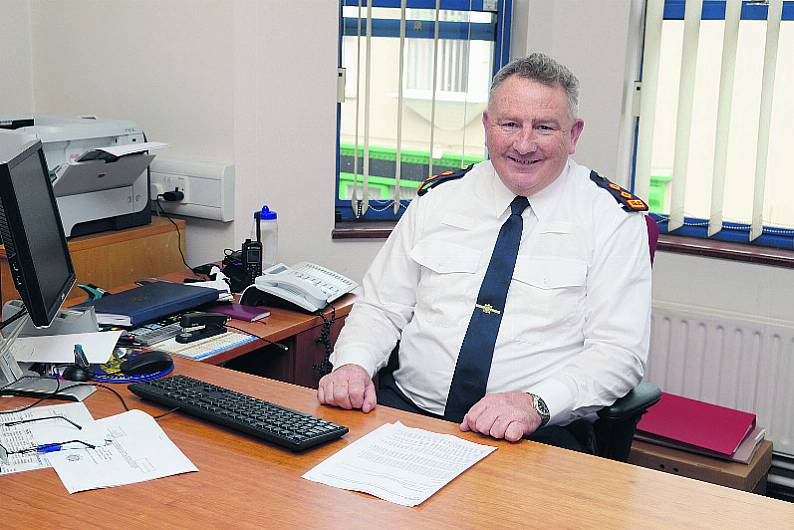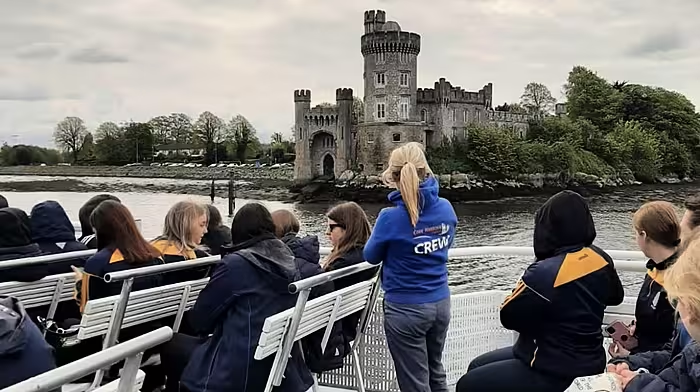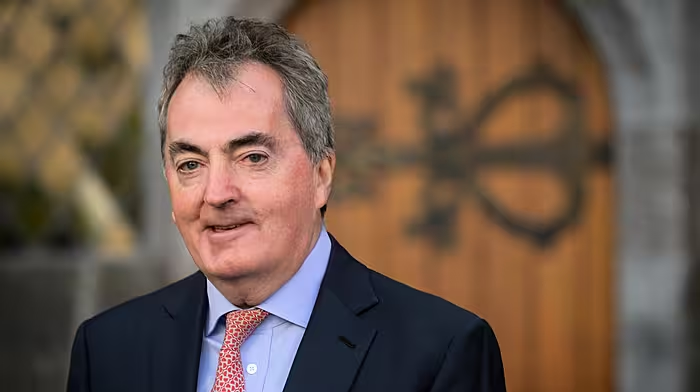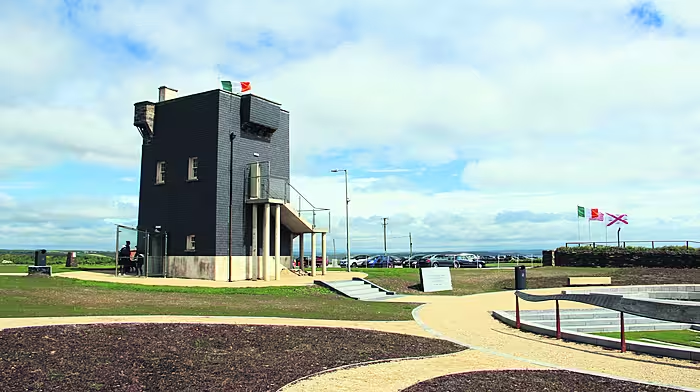A few days before his official retirement, outgoing Chief Supt Tom Hayes told Siobhán Cronin about his varied career, much of which was spent in West Cork
THE response of the West Cork community to the Air India disaster in 1985 showed the true spirit of the people of the region, according to Chief Supt Tom Hayes.
The garda chief recalled how the people of the area, and indeed the city, rose to the challenge when confronted with the tragedy that took the lives of 329 people, that day in June.
Chief Supt Hayes, who gave evidence at the enquiry in Canada, recently recalled his involvement with the recovery and identification of bodies, preservation of the scene and gathering of evidence.
‘The Indian people had a great respect for the Irish from that day,’ he told The Southern Star last week.
The West Cork Garda Division chief was reflecting on his almost forty years in the force before his retirement this week.
‘There is something very special about the people here, the people in Cork,’ said the Waterford supporter, who originally hails from Bunmahon.
Having entered Templemore in 1977 without any family connection to the police force, a young Tom Hayes found himself sent to Bishopstown for his first posting, after 22 weeks of training.
He made his home in the western city suburb, where he remains living today, with his wife Mary.
‘Bishopstown was a busy place then,’ he said, ‘the hospital opened the same year, as did the Wilton Shopping Centre, and the two colleges were also in my area.’
After 13 years of covering the local beat, he found himself promoted to sergeant and moved to Rosscarbery where he fondly remembers his colleagues were Billy Creedon and Seamus Walsh.
Burglaries at isolated farm houses were among the most serious crimes he recalls investigating there at that time, but within a year he found himself in Bandon Garda Station, working as a Det Gda Sgt.
‘Travelling criminals were then, as they are now, a big issue, and developing local knowledge was important,’ he noted. Among one of the major successes for local gardai in this division was a drugs haul off Mizen Head in 2008.
Operation Seabight invovled the seizure of €750m of cocaine off the yacht Dancing with Waves.
‘There was always very good co-operation between the gardaí and the other agencies in West Cork, and in particular the navy and the customs who, together with An Garda Síochána form the Joint Task Force to combat drug importation, and I would like to pay tribute and thank all of the statutory and voluntary agencies, that I have worked with in a variety of different roles during my career, for their assistance and co-operation at all times,’ he said.
He laughed as he noted his next posting after Bandon was to head up the fixed charged penalties office in Dublin’s O’Connell Street, attached to Store Street.
‘They brought a lad up from the country to run that,’ he said, adding that it was great experience to be based in Dublin for a while, right at the heart of the city, where he then had the rank of Inspector.
Another promotion – this time to Assistant Supt – brought him back down south, to Midleton Garda Station, although there was also a short spell in Castleblaney in Co Monaghan, during the Foot and Mouth Disease alerts.
‘All during that time my family stayed in Bishopstown, we never moved,’ he said, pointing out that Cork city was always a handy location for commuting – whether he needed to be in Midleton, Monaghan or up in the capital.
There was also time spent working with the Morris Tribunal into the corruption allegations regarding gardai in Co Donegal. Even though he was sent ‘up from the south’ to probe the workings of his own colleagues, Chief Supt Hayes said he experienced no animosity whatsoever. ‘I have to say that I got great co-operation from the gardai during that time.’
His next garda station posting was to the busy Anglesea Station in Cork city centre. ‘Emigration was the big issue then, we had a reception centre on Airport Hill, and we also had a lot of people coming in seeking asylum.’
He was also involved in co-ordinating a number of high profile security and traffic events, such as the visit of Bill Clinton to Limerick in 1998, and the arrival of the Tour de France cycle race the same year.
He also co-ordinated the Irish Open when it was held in Fota Island Golf Resort in East Cork in 2001, and again in 2002.
As Supt, he was moved to Guarranabraher, a divisional HQ on the northside, also covering the suburbs of Fairhill, Blarney and Ballincollig.
‘It’s a very community-oriented part of Cork, which experienced a lot of social problems in the past but is now very much improved as a result of the excellent work by the community, together with the various agencies including the local gardai. I spent two years there as the district Supt.’
Then it was back to Anglesea Street, where he was appointed Det Supt in a role covering the southern region, dealing with serious crime and subversion, an assisting gardai in West Cork with their various investigations.
It was during this time that he was also called in to help assist in the investigation into the murder of Anne Corcoran – the 60-year-old widower who was murdered by Bandon man Oliver Hayes, on January 19th 2009. He also helped with the investigation into the murder of Gary Bull, who was killed, and had his body dumped in a slurry tank in Dunmanway, two years earlier.
But it was back to West Cork full-time for Tom Hayes when, in 2010, he was promoted to the rank of Chief Supt in Bandon – the West Cork divisional headquarters, to replace Chief Supt Michael Finn.
‘At this stage, I knew West Cork very well, and I knew the people were very supportive of policing,’ he said, acknowledging that it was a very positive career move.
It was during this time that he was also drawn into the investigation into the drugs haul on the Makayabella yacht – which involved a plot to smuggle a massive stg£164m of cocaine into the UK in 2014.
But one of the most controversial aspects of policing during his career has been the decision to close several garda stations in recent years.
‘The science behind it, if you want to call it that, was that there would be more resources operating outdoors and a great level of footfall so they would be more effective on the ground,’ he explained. ‘Although there were initial complaints from some community groups, I think most people have now found that we can be more effective.’
Chief Supt Hayes’ division has seen a steady drop in almost all crime rates in recent years. ‘Overall, property crime is down 34% on this time last year, a category which includes burglaries, which have dropped by 33%,’ he said, ‘and that has been falling every year since 2011. Of course, any crime is one crime too many and if you are the victim of any of those crimes, then that is what concerns you.’
The gardai believe that schemes like Neighbourhood Watch and Community Alert have had a significant role to play in keeping crime down, and he pointed out that the text alert system – which was first launched in West Cork – has now been hugely successful throughout the country.
‘We find there has been a very responsible use it,’ he said, adding that there are a number of systems in place to ensure information is verified before it is sent out to the recipients.
‘It has empowered local people and they have been of great assistance to our resources.’
Another new initiative in his time has been the introduction of the Reserve Garda force. There are now several reserve gardai in the division, and recruitment is continuing. ‘Some people have moved on, and a few have even joined the regular force as a result,’ he explained.
While drink was the main issue affecting public order when Tom Hayes joined up in the late seventies, he acknowledged there are other issues now – drugs, including an upsurge in sythentic drugs – are now a cause for concern in many divisions.
‘We would be concerned about them, but it’s not a major problem in this area,’ he said. ‘Education is the key here, and while we discovered a lot of grow houses in recent years, we are not finding them to the same extent now. Though that could be down to a number of factors. However, we are finding heroin now in country towns, and I would have a concern about that.’
Along with the regular traffic issues of speeding, insurance and car tax, Chief Supt Hayes said the use of phones while driving was another relatively recent phenomenon. ‘There needs to be a change in behaviour there.’
One legacy that the whole division seems to be proud of is the hugely successful annual Youth Awards, which was initiated by James O’Mahony and SuperValu. ‘That has gone from strength to strength,’ he pointed out, ‘and there has been some outstanding work done by young people over the years. It’s great for them to have on their CVs and it shows what can be achieved.’
When asked what was the most obvious change in policing in his forty years, the Chief Supt said it was undoubtedly ‘public expectation’.
‘The public now feel they have a right – and they should – to expect their case will be properly investigated and that they will be kept informed at all times. Society is more educated now about policing. There is a lot more oversight of our jobs now, but there should be. But it does put a lot more strain on garda resources. We fully realise that there is a need to improve and deliver a better service, and we are happy to work with those bodies.’
There have been fears among gardai that the ‘brain drain’ of retiring gardai will leave a deficit of knowledge within the system, and Chief Supt Hayes’ wealth of local knowledge and crime detection is a prime example of that.
‘I’m in no hurry to retire,’ he said, ‘and I believe there is room to identify some scheme to let the knowledge that has been built up be retained, or bring people back with their expertise.’
However, he also sees his retirement as a chance to look at his skillset and ‘pursue other areas of interest’. Among those, he cites sailing and cycling as possible options, and perhaps even a ‘return to college’.
Thanking the business people of West Cork (‘I think they are very go-ahead, you only have to look at Ludgate to see this area’s self-help attitude’), the community organisations and the staff he has worked with ‘for their support and co-operation over the years’, Chief Supt Hayes says he’s not yet ready to say goodbye to the area.
‘I’d also like to thank the Coast Guard, Civil Defence, and colleagues past and present,’ he said.
As an avid GAA fan, and a coach with his local Bishopstown club, he would like to continue his interest in sport, but also spend a bit more time travelling around West Cork – but this time he won’t be detecting crime, he’ll be simply relaxing!









